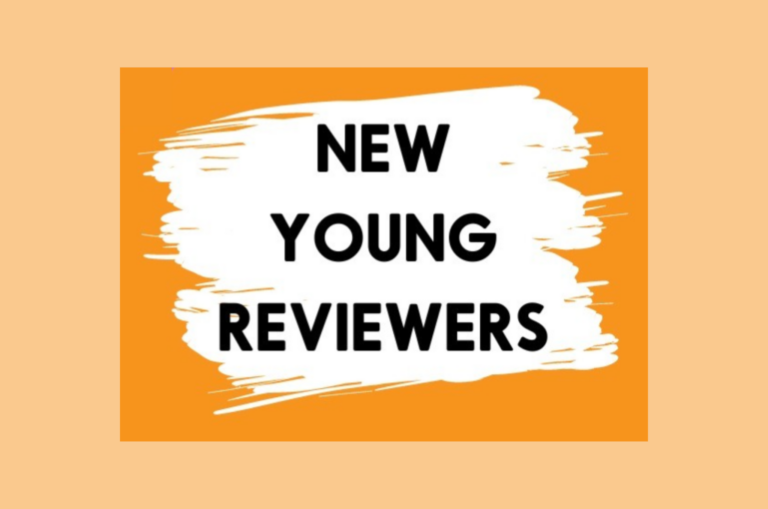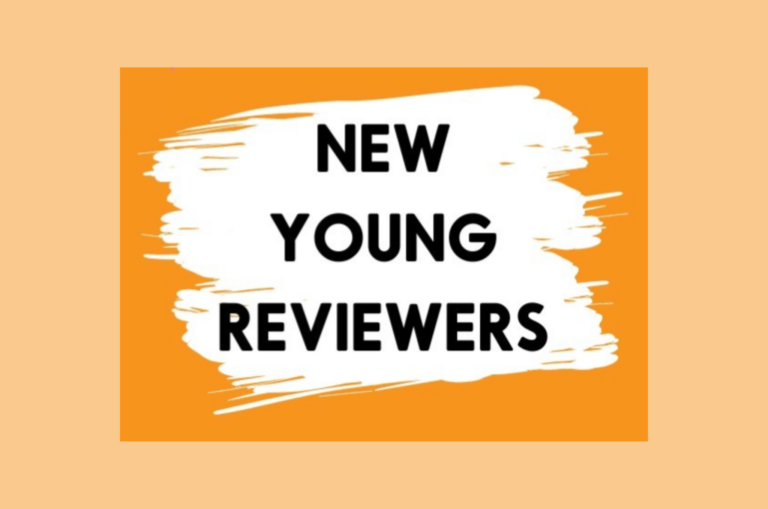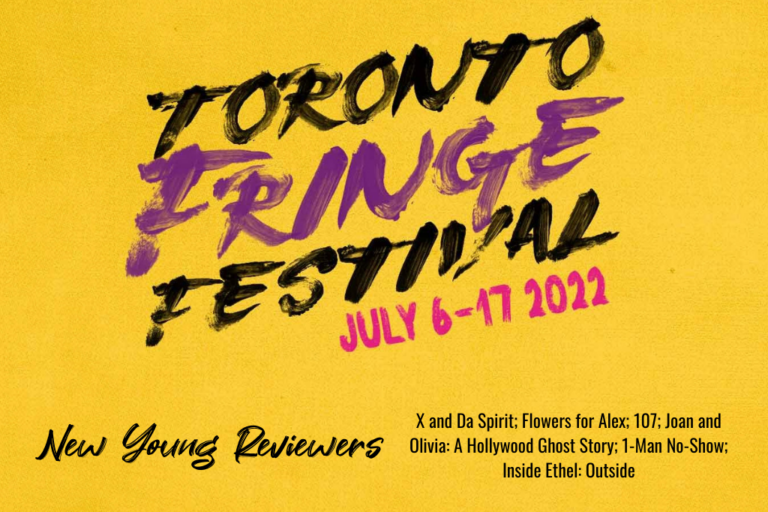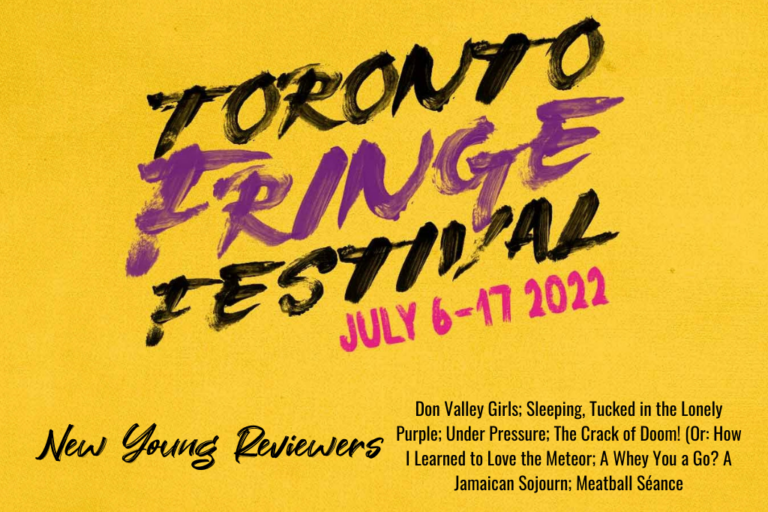The First Next Stage 2022 New Young Reviewers Roundup
After online workshops and early access to shows shows, the first round of reviews from the Next Stage New Young Reviewers Program (from Toronto Fringe) are here!
Led by Signy Lynch (Contemporary Theatre Review, Canadian Theatre Review, Intermission Magazine) and Stephanie Fung (Kingston Theatre Alliance, Canadian Theatre Review, Single Thread Theatre), the New Young Reviewers Program is a workshop series and writing group for emerging theatre and performance reviewers across Canada. Open to participants ages 15 and up, this program introduces participants to the basics of theatre reviewing, helping them develop responses to Toronto Fringe and Next Stage performances. With support from the Jon Kaplan Legacy Fund, the program encourages participants to explore emerging creative approaches to criticism and to begin to define themselves as critics and reviewers.
Look below to read the first two reviews from the 2022 Next Stage New Young Reviewers Program!
“Fiercely Courageous”: Joy and Blindness in Vivian Chong’s Sunglasses Monologue
Reviewed by Holly Hebert

When it comes to theatre, there are a few things I am a sucker for. One is true stories being told by the people they belong to. The rawness and vulnerability of artists sharing their authentic experiences is a feeling that I love. It leaves me feeling raw and vulnerable in turn, ready to walk back into life with a slightly-altered perspective.
However, Vivian Chong’s solo show, The Sunglasses Monologue, which tells the true story of her journey after waking from a coma, proves to be quite empowering and has left me ready to take on the world.
Pre-recorded in front of a live audience, the show begins with Chong centre stage, showing off a pair of gigantic, bright blue sunglasses that scream ‘superstar’. She launches her monologue by talking about the awkward stares and ignorant questions she often receives in regard to her blindness and does so with marvelous comedic timing that leaves the audience bellowing.
Only a few minutes later, the comic routine takes a drastic turn as Chong begins strumming a ukulele and singing a self-written ballad. Hearing her voice invoked in me the same feeling as curling up beside a fire in a favourite sweater. Soft, sweet, and comfortable. Shortly, the song mellows out and Chong details the slow rise from her coma.
Songs remain a pillar of the show, spacing out the tale of how Chong finds herself in the hospital, the struggles she endures through recovery, and her ultimate loss of sight. Aside from these melodic breaks in speech, the show is exactly what it claims to be: a monologue. At times, this delivery became repetitive; a lack of dynamic inflection causing lulls in her incredible story. While her descriptions of hospital settings help to conjure images for Blind and sighted audiences alike, they could have used more vocal variation to keep the show’s pace.
Chong’s momentum does build when her speech and song give off an electric energy. It’s in these moments where it’s obvious she is having fun onstage. She sings with passion, she sings together with an audience, and she sings her own praises. Ultimately, The Sunglasses Monologue is a story of facing one’s fears and overcoming the feeling of being stuck. Vivian Chong did both and is damn proud of it. Now, she wants everyone else to do the same. Fiercely courageous, she gives an audience strength and, more than that, does so with joy.
“Soothing, Fun, and Relatable:” Food as More Than Fuel in Stories of a Dish
Reviewed by Sayak Sneddon-Ghosal

Stories of a Dish is the tale of one man’s quest to become a better cook, set against the backdrop of the COVID-19 pandemic. As we watch performer Himanshu Sitlani struggle with heat, timing, and recipe formulation, a deeper story — about happiness, identity, culture, and coming of age — unfolds.
Like a magic ingredient itself, food is the element that binds together these varied themes. The experience of preparing and sharing food shapes our lives, provides formative experiences, and plays a vital role in building community and relationships with friends and family.
These connections are explored in Sitlani’s opening monologue on the importance of food. In it, he disagrees with the notion that food is merely “fuel” — a common belief since the rise of diet culture which ignores the emotional and communal nutrition food also delivers. The monologue touches on how food can transport us back to special moments in life because it becomes entwined in so many of life’s biggest moments, happy or sad. This nuanced speech is equal parts laugh-out-loud humour and thought-provoking insights. It also grounds the play in current reality, as it recalls the empty-grocery store days of the early pandemic.
From this opening monologue, Sitlani transitions into recalling significant foods and memories, like Magi (Indian-style instant noodles) and how his family could only cook Indian food, characterized by strong spices and colourful flavours that cause rich smells, with open windows at 5am or 11pm to avoid eviction. These examples demonstrate the range of the show — sweet and relatable musings about seemingly random foods, and honest conversations infused with humour about serious topics like racism. Sitlani also attempts basic cooking (even an egg proves problematic) and comments on cultural expectations about who cooks and why, and directly (and sometimes profanely) addresses those with biases toward food which are shorthand for bias of more harmful kinds.
Stories of a Dish features just one actor, the aforementioned Himanshu Sitlani. His dynamic performance brings the script to life, making the piece feel like catching up with an earnest and fast-talking old friend. His dynamism drives this 40-minute piece, and his always energetic, sometimes teetering but never quite over-the-top performance keeps you engaged throughout the whole show.
Its perfect blend of cultural commentary, relevant and relatable insights, and food-centred humour made me feel comforted. Its steady pace from beginning to end and perfect runtime kept me engaged. And its excellent writing and performances were delightful to witness.
The best word I have to describe Stories of a Dish is “satisfying.” It was like hot chocolate on a cold day, warm soup on a rainy day, or ice cream on a sad day. It was soothing. It was fun. It was relatable. It nourished my mind, and brought forth my own reminiscences around food.
And really — what more do we need from our art in these languishing times?
Next Stage Theatre Festival opens online today, Jan. 19, 2022. Tickets are available here. You can find out more about Next Stage 2022 here.














Comments